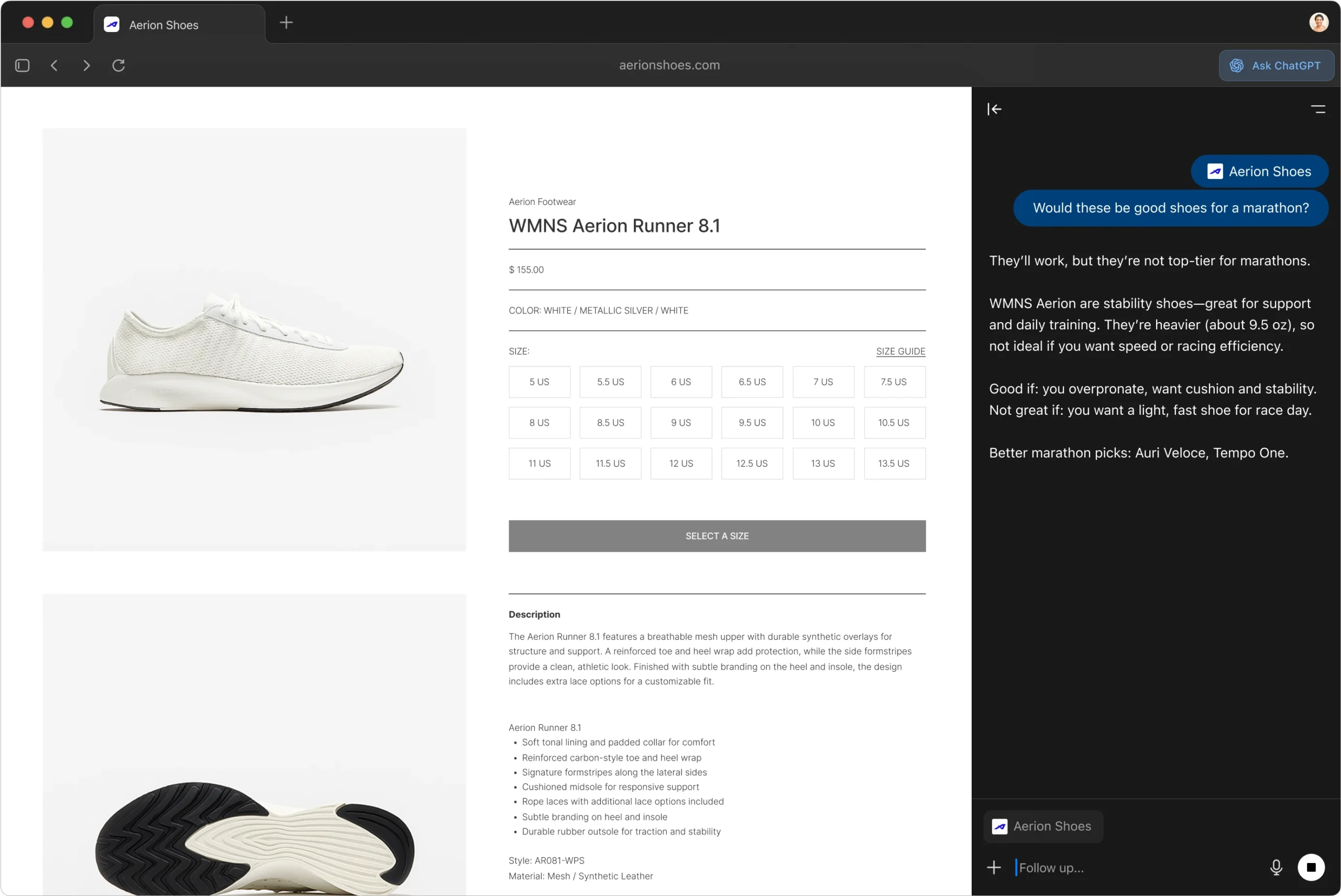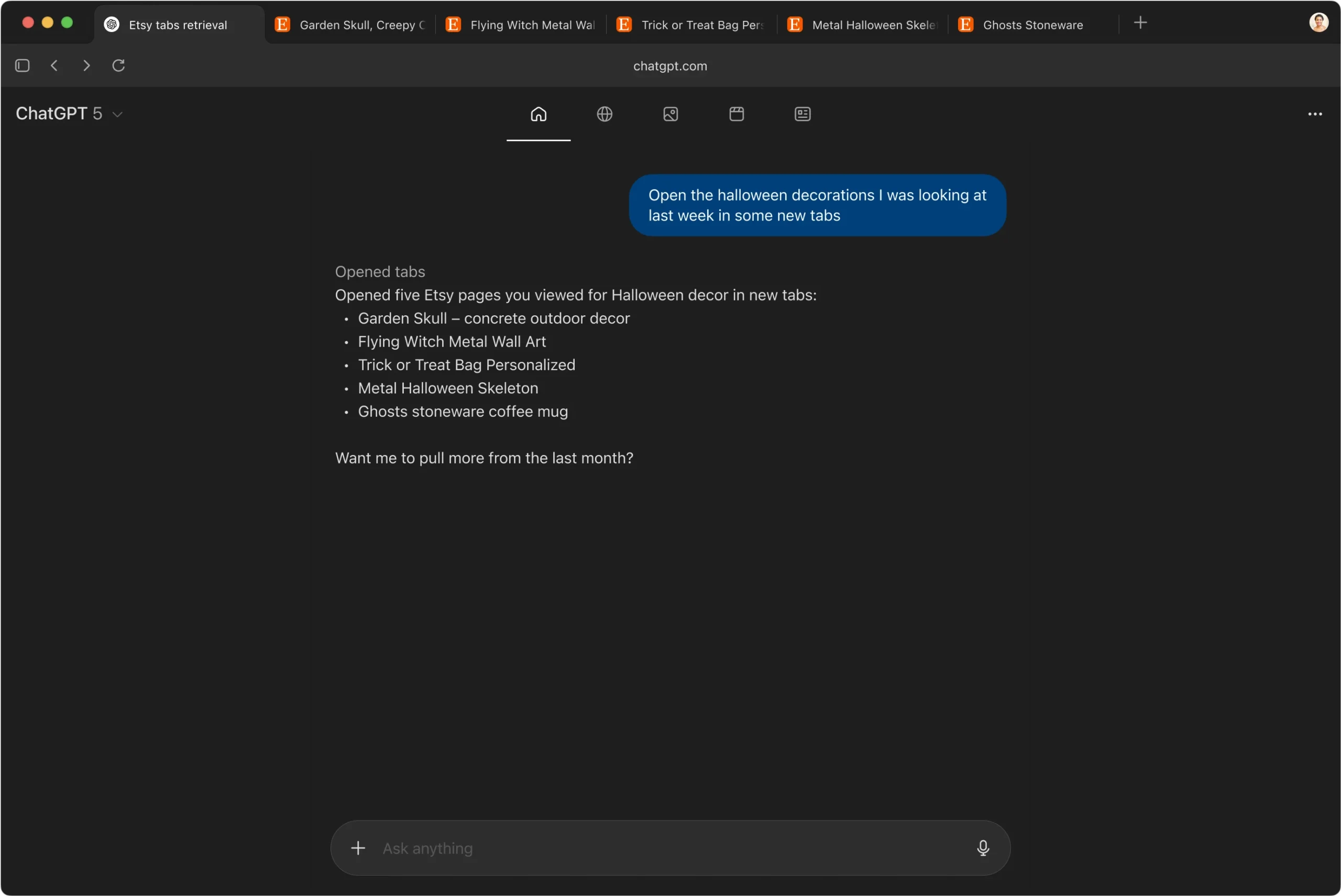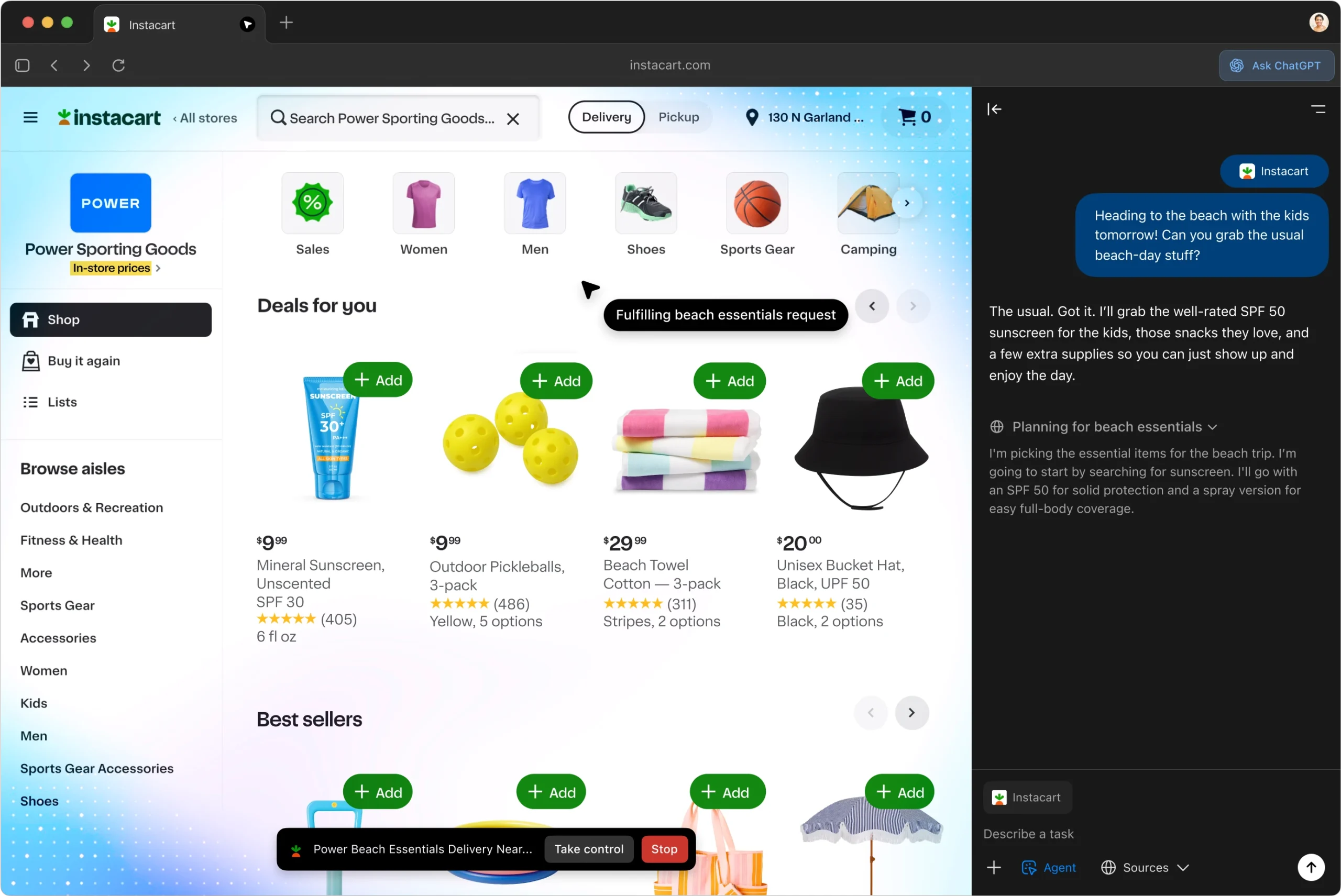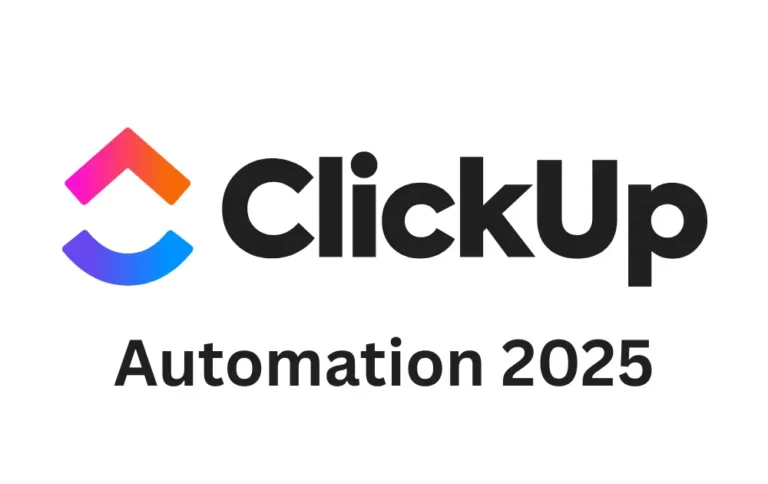ChatGPT Atlas Review: 30 Days Later (Shocking)
When OpenAI announced ChatGPT Atlas in October 2025, I’ll admit—I was skeptical. Another browser? In a market dominated by Chrome, Safari, Edge, and Firefox, what could possibly make someone switch?
But after spending considerable time testing Atlas on macOS, I’ve come to realize this isn’t just “another browser with AI features.” OpenAI is attempting something more ambitious: reimagining what browsing should look like when AI is at the core, not an afterthought.
Here’s my honest, hands-on review of ChatGPT Atlas—what works, what doesn’t, and whether it’s worth making the jump.
Table of Contents
- What Is ChatGPT Atlas?
- First Impressions: Setup and Onboarding
- The Interface: Familiar Yet Different
- The ChatGPT Sidebar: Your Always-On AI Assistant
- Browser Memories: Helpful or Creepy?
- Agent Mode: The Future (Sort Of)
- Smart Suggestions: Hit or Miss
- Performance and Technical Considerations
- Who Should (and Shouldn’t) Use Atlas
- The Competitive Landscape
- Do We Need AI Browsers?
- Privacy Concerns and Criticism
- Pricing and Availability
- Final Verdict: Should You Switch?
- Frequently Asked Questions
What Is ChatGPT Atlas?
ChatGPT Atlas is OpenAI’s first web browser, built on Chromium with ChatGPT deeply integrated into every aspect of the browsing experience. It’s currently available on macOS for all ChatGPT users (Free, Plus, Pro, Go, and in beta for Business/Enterprise/Edu accounts), with Windows, iOS, and Android versions coming soon.
The core promise? Bring ChatGPT with you across the web for instant answers, smarter suggestions, and autonomous task completion—all without constantly switching tabs or copy-pasting content.
First Impressions: Setup and Onboarding
Setting up Atlas was refreshingly straightforward. After downloading from chatgpt.com/atlas, I signed in with my ChatGPT account and was given the option to import bookmarks, saved passwords, and browsing history from Chrome.
The setup wizard immediately asked about two key features:
- Browser Memories – Whether I wanted ChatGPT to remember context from sites I visit
- Data Controls – How my browsing data would be used (or not used) for model training
I appreciated the transparency here. By default, OpenAI doesn’t use your browsing content to train their models. You have to explicitly opt-in through “include web browsing” in settings. Even then, websites that opt out of GPTBot won’t be trained on.
The Good: Clear privacy controls upfront, easy migration from existing browsers
The Bad: The setup flow pushes fairly aggressively for you to enable memories and data sharing—you need to actively decline if you want maximum privacy
The Interface: Familiar Yet Different
Atlas looks and feels like a modern Chromium browser—because it is one. If you’ve used Chrome, Edge, or Brave, you’ll feel immediately at home. The address bar, tabs, and navigation work exactly as you’d expect.
The difference? A persistent ChatGPT icon in the toolbar and a new tab page that’s less Google and more conversational.

The New Tab Experience
Instead of a search bar with shortcuts, Atlas greets you with a clean interface that accepts both questions and URLs. Type “best noise-canceling headphones under $200” and you get AI-powered results organized into tabs: Links, Images, Videos, News.
This is where Atlas starts to diverge from traditional browsers. The results aren’t just search listings—they’re synthesized answers with supporting sources, similar to Perplexity or Google’s AI Overviews, but more conversational.
My Take: For research-heavy tasks, this is genuinely useful. For quick navigational searches (“facebook.com”), it feels like overkill.
Browser Memories: Helpful or Creepy?
This feature divided my opinion the most. Browser Memories allow ChatGPT to remember context from sites you visit and surface that information later when relevant.
Real-World Example: I spent a week browsing job postings in the AI/SaaS space. Later, when I opened Atlas and asked “what trends are you seeing in the roles I’ve been looking at?”, it compiled insights about common requirements, salary ranges, and emerging skills.
That’s genuinely impressive. It’s also the kind of feature that makes privacy-conscious users uncomfortable.
The Privacy Trade-Off
To OpenAI’s credit, Browser Memories are:
- Completely optional
- Viewable in settings at any time
- Archivable or deletable whenever you want
- Automatically cleared when you delete browsing history
You can also use incognito mode, which logs you out of ChatGPT entirely and doesn’t save anything to your history.

My Stance: For professional research and productivity tasks, I find this feature valuable. For general browsing, I keep it off. The ability to toggle it per-session would be ideal.
Agent Mode: The Future (Sort Of)
Available in preview for Plus, Pro, and Business users, Agent Mode is Atlas’s most ambitious feature. It lets ChatGPT complete end-to-end tasks autonomously while you supervise.
Test 1: Meal Planning and Grocery Shopping
Task: “Research a week of high-protein vegetarian meals, create a shopping list, and add everything to my Instacart.”
Result: Atlas successfully researched meal ideas, compiled ingredients with quantities, and navigated to Instacart. It added about 80% of items correctly to my cart, but struggled with a few specialty ingredients that required brand-specific searches.
Time Saved: What would’ve taken me 45-60 minutes took about 12 minutes, with light supervision.
Test 2: Event Planning Research
Task: “Find the top 5 co-working spaces in Austin with day passes under $50, and compile their amenities, WiFi speeds, and booking links.”
Result: Impressive. Atlas visited multiple websites, extracted relevant information, cross-referenced pricing, and organized everything into a clean comparison table—all without me lifting a finger.
Test 3: Form Filling and Document Editing
Task: “Fill out this vendor application using information from my LinkedIn profile.”
Result: Mixed. It successfully pulled basic information but required my confirmation before submitting (which is good). However, it struggled with multi-page forms and occasionally lost context between sections.
The Safety Guardrails
OpenAI has implemented important limitations:
Cannot:
- Run code in the browser
- Download files or install extensions
- Access other apps or your file system
- Read/write ChatGPT memories
- Access saved passwords or autofill data
Does:
- Ask before taking important actions (submitting forms, making purchases)
- Allow you to pause, interrupt, or take over at any time
- Show you exactly what it’s doing as it works
My Verdict on Agent Mode: This is genuinely impressive technology, and I can see it becoming transformative for research-heavy workflows. But it’s still in preview, and it shows. Expect to supervise closely and occasionally take over when it gets confused.
For routine tasks like “find all PDFs I downloaded this month about marketing automation,” it’s excellent. For complex, multi-step workflows requiring judgment calls, you’ll still need to stay involved.
Smart Suggestions: Hit or Miss
Atlas can supposedly remember what you’ve explored and suggest what to do next—returning to past pages, digging deeper, surfacing related ideas, or automating routine tasks.
In practice, this feature was inconsistent. Sometimes I’d get genuinely helpful suggestions like “Would you like me to compare pricing across these three SaaS tools you’ve been researching?” Other times, the suggestions felt generic or irrelevant.
I suspect this will improve as the system learns individual usage patterns, but it’s not yet at the “mind-reading assistant” level OpenAI seems to be aiming for.
Performance and Technical Considerations
The Good:
- As a Chromium-based browser, Atlas supports all modern web standards
- Extensions from the Chrome Web Store work seamlessly
- Page load times are comparable to Chrome
- Syncs across devices (when other platforms launch)
The Bad:
- Slightly higher RAM usage than Chrome (likely due to AI processing)
- Occasional lag when the sidebar is open on complex web apps
- Beta status means you’ll encounter bugs (I experienced a few crashes during heavy multitasking)
Who Should (and Shouldn’t) Use Atlas
Atlas Is Great For:
- Heavy Researchers: If you spend hours reading papers, articles, and documentation, the summarization and synthesis features are genuinely time-saving.
- Content Creators: The ability to quickly draft, edit, and rewrite content without switching contexts is valuable for writers, marketers, and social media managers.
- Early Adopters: If you’re excited about AI-powered workflows and don’t mind some rough edges, Atlas offers a glimpse of where browsing is heading.
- ChatGPT Power Users: If you already have ChatGPT open in a tab 24/7, integrating it directly into your browser makes sense.
Atlas Might Not Be For You If:
- You Prioritize Privacy Above All: Despite OpenAI’s controls, the level of access Atlas requests to your browsing behavior will concern privacy-focused users.
- You Need Maximum Performance: The AI overhead means Atlas isn’t the leanest browser option, especially on older hardware.
- You’re Deeply Invested in Another Ecosystem: If you rely heavily on Safari’s Apple ecosystem integration or Chrome’s enterprise features, switching carries real costs.
- You Just Want to Browse: If you primarily use your browser for casual web surfing, email, and social media, Atlas’s AI features will feel like unnecessary complexity.
The Competitive Landscape
Atlas isn’t the first AI browser. Perplexity launched Comet, and established browsers like Chrome, Edge, and Safari are rapidly integrating AI features.
What sets Atlas apart is the depth of integration. This isn’t AI bolted onto an existing browser—it’s a browser designed around AI from the ground up.
However, that’s also its biggest challenge. Chrome has decades of refinement, billions of users, and deep integration with the web ecosystem. Safari owns iOS. Edge has enterprise adoption.
For Atlas to succeed, it needs to be dramatically better, not just incrementally more useful.
Do We Need AI Browsers?
Here’s my honest take: I’m not sure we do.
Don’t get me wrong—Atlas has genuinely useful features. The sidebar has saved me time. Agent mode is impressive when it works. The research synthesis is valuable.
But I question whether these features require a separate browser, or whether they’d be better served as browser extensions that work across platforms.
OpenAI’s bet is that controlling the entire browsing experience—the gateway to the web—is strategically essential. They’re probably right from a business perspective. But from a user perspective, asking people to switch browsers is a big ask.
Privacy Concerns and Criticism
It’s worth noting that Atlas has faced criticism from privacy advocates and tech commentators.
Tech critic Anil Dash called Atlas “the first browser that actively fights against the web,” pointing out how aggressively the setup process pushes users to enable memories and data tracking.
MIT Technology Review noted that “without giving people more reason to actually switch from entrenched browsers like Chrome or Safari, Atlas feels like an empty salvo in the new browser wars.”
These criticisms aren’t entirely unfair. While OpenAI has implemented privacy controls, the default experience is designed to encourage maximum data sharing. That’s a philosophical choice that won’t sit well with everyone.
Pricing and Availability
Current Availability: macOS only
Coming Soon: Windows, iOS, Android
Pricing Tiers:
- Free Users: Full access to core features, limited ChatGPT queries
- Plus ($20/month): Agent mode, higher query limits
- Pro ($200/month): Priority access, maximum capabilities
- Business/Enterprise: Custom controls and admin features
Special Offer: OpenAI is currently offering increased ChatGPT data limits for 7 days if you set Atlas as your default browser.
Final Verdict: Should You Switch?
Rating: 3.5/5 Stars
ChatGPT Atlas is an ambitious, impressive first attempt at reimagining the browser for the AI age. It has genuinely useful features that can save time and streamline research-heavy workflows.
But it’s also a 1.0 product with rough edges, performance concerns, and a value proposition that won’t resonate with everyone.
My Recommendation:
- Try Atlas if: You’re a ChatGPT Plus or Pro subscriber who does extensive online research, content creation, or task automation. The integrated workflow is worth experiencing.
- Wait if: You’re happy with your current browser and don’t feel constrained by switching tabs to use ChatGPT. Atlas doesn’t yet offer enough compelling advantages to justify the disruption of switching.
- Skip if: You prioritize privacy, browser performance, or simply want a straightforward browsing experience without AI intervention.
What I’d Like to See in Future Updates
- Performance optimization: Reduce RAM usage and improve responsiveness with the sidebar open
- Better context management: Maintain conversation context across multiple tabs and sessions more reliably
- Granular memory controls: Per-site or per-session memory settings, not just all-or-nothing
- Agent mode refinement: Improve multi-page form handling and reduce the frequency of “stuck” moments
- Cross-platform launch: Until Windows and mobile versions arrive, Atlas’s utility is limited
The Bottom Line
ChatGPT Atlas represents a bold vision for what browsing could become in an AI-first world. It’s not perfect, and it’s not for everyone, but it’s undeniably innovative.
As someone who spends hours daily researching tools, analyzing software, and writing content, I’ve found real value in Atlas’s approach. The ability to summarize, synthesize, and take action without constant context-switching is legitimately helpful.
But I also recognize that OpenAI is asking users to trust them with an extraordinary amount of data and behavioral information. That’s a big ask in an era of increasing privacy concerns.
My advice? If you’re curious, download it and test it for a week. The free tier gives you enough functionality to evaluate whether the AI-integrated approach fits your workflow.
Just remember: you can always switch back. And unlike some of the hype suggests, that’s probably what most people will do—at least until Atlas proves it’s not just different, but genuinely better.
Frequently Asked Questions
Is ChatGPT Atlas available on Windows and mobile devices?
Not yet. Atlas is currently available on macOS only, but Windows, iOS, and Android versions are coming soon. The exact launch dates haven’t been announced by OpenAI.
Can I use ChatGPT Atlas with a free ChatGPT account?
Yes, Atlas is available to all ChatGPT users, including Free tier users. However, some advanced features like Agent Mode are limited to Plus and Pro subscribers.
Does OpenAI use my browsing data to train ChatGPT?
By default, no. OpenAI does not use your browsing content to train their models. However, during setup, you can opt-in to data sharing if you wish. Websites that have opted out of GPTBot indexing won’t be trained on regardless.
How does Browser Memories differ from regular browsing history?
Browser Memories are AI-powered summaries that ChatGPT creates from pages you visit, allowing it to understand context and surface relevant information later. Regular browsing history is just a list of URLs. Memories are optional and can be disabled anytime.
Can I migrate my bookmarks from Chrome to Atlas?
Yes, during the setup wizard, Atlas offers to import bookmarks, saved passwords, and browsing history from Chrome or other browsers you currently use.
Is Agent Mode secure? Can it access my passwords?
OpenAI has implemented security guardrails. Agent Mode cannot access saved passwords, autofill data, or your file system. It must ask for confirmation before taking important actions like submitting forms or making purchases.
How does Atlas performance compare to Chrome?
Page load times are comparable to Chrome. However, Atlas uses slightly more RAM due to AI processing. Users with older hardware may notice occasional lag when the sidebar is open on complex web apps.
What happens if I delete my browsing history?
Browser Memories are automatically cleared when you delete browsing history. You can also manually delete or archive specific memories in settings at any time.








